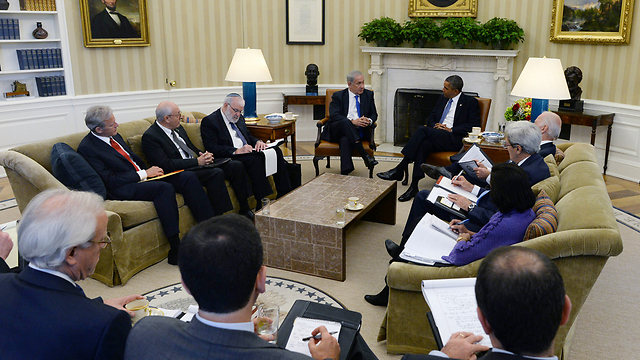
Israeli pressure on Congress: Don't ease Iran sanctions
Ahead of West-Iran Geneva talks, AIPAC memo says there are no indications Tehran is planning to halt nuclear program; Defense Minister Ya'alon in DC as part of effort to prevent lifting of sanctions
WASHINGTON – A week before the talks between Iran and the six world powers are scheduled to begin in Geneva, a battle is being held in Washington regarding the US' approach to the Islamic Republic's nuclear program. Some are demanding that the White House compromise and ease the sanctions in order to help Iranian President Hassan Rohani deal with the conservatives in his country. On the other side stands Israel, which is working behind the scenes to prevent the lifting of sanctions.
A week ago, ahead of the UN General Assembly's annual meeting, Prime Minister Benjamin Netanyahu met with a number of members of Congress, including Senate Foreign Relations Committee Chairman Robert Menendez, who announced he was considering the possibility of tightening the sanctions. On Monday Defense Minister Moshe Ya'alon also arrived in Washington for meetings with Defense Secretary Chuck Hagel and members of Congress that will focus on Iran.
Related stories:
- Op-ed: Only one exposing truth
- Obama: Iran 'year or more' from nuke capability
- Netanyahu: Iran's Khamenei 'heads a cult'
Congress is no less important than the White House. It passed the sanctions legislation, and it can also remove the sanctions. This is why Israel's activity these days is focused on Capitol Hill, with the goal of preventing the Obama administration from reaching premature compromises with Iran.
Pro-Israel lobby AIPAC sent a memo to members of Congress overnight Tuesday which warned of premature concessions and said that negotiations can be successful only if Iran suspends all uranium enrichment activities. AIPAC warned in the letter that Iran was very close to achieving nuclear weapons capability and said the US must make it clear that it would not consider easing the sanctions until Iran suspends its nuclear program in a manner which can be verified.
Video courtesy of jn1.tv
Last week, during a hearing at the Senate Foreign Relations Committee, Under Secretary of State for Political Affairs Wendy Sherman, who will be representing the US during the negotiations in Geneva, pleaded with Congress not to ramp sanctions on Iran before the talks commence.
Sherman is ware that three months ago the House voted 400-20 to hit Iran with the toughest sanctions yet over its nuclear program. The legislation is aimed at cutting Iran's oil exports by another 1 million barrels per day over a year to near zero, in an attempt to reduce the flow of funds to the nuclear program. The bill still has to be passed in the Senate and signed by President Barack Obama before becoming law.
Netanyahu's associates believe Obama has yet to formulate a clear plan for the negotiations, so Israel is looking to increase pressure on the White House through Congress. Over the past few days, Congress members from both the Democratic and Republican parties have called to tighten the sanctions, saying this was the only way to cause Iran to halt its nuclear program.
Sen. Mark Kirk (R-Ill.), a staunch supporter of Israel, responded to Sherman's statements urging the US Senate to hold off on considering any new sanctions against Iran. "The State Department should not aid and abet a European appeasement policy by pressuring the Senate to delay sanctions while the world’s leading sponsor of terrorism races toward a nuclear weapons capability," he said.
"The international community should judge Iranian leaders by their actions, not their words. So long as Iran continues to pursue a nuclear weapons capability, build longer range ballistic missiles, sponsor terrorism around the world and abuse human rights, the Senate should impose maximum economic pressure on Iran to give diplomacy a chance to succeed."
An article published in The National Journal said: "It may be hard to believe after congressional infighting shut down the government this week, but Republicans and Democrats do agree on something: Iran should not be trusted. New Iranian President Hassan Rohani's recent charm offensive promising political latitude in nuclear negotiations has fallen flat on Capitol Hill, as did the Obama administration's optimism that sanctions against Iran could be lifted, even within months, if the parties reach a 'good deal' with fail-safe measures ensuring that Tehran's nuclear program is peaceful."
"President Obama may not like it, but Congress holds the power over sanctions, his main bargaining chip. The financial noose around Iran is mandated by Congress, and it can only be lifted by Congress—and there's no guarantee lawmakers will agree with whatever the White House considers an acceptable deal," the weekly magazine said.
Menendez (D – N.J.) and Senator Lindsey Graham (R - S.C.) co-authored an editorial published by the Washington Post in which they that the "new face of Iran we anticipated seeing at the United Nations last week sounded and looked quite similar to the old face of Iran we have come to know.
"We expected a charm offensive. We readied ourselves for a possible diplomatic breakthrough. But we were left underwhelmed," they wrote.
"The sanctions efforts we support in Congress, alongside the four UN Security Council resolutions criticizing Iran’s nuclear program and applying multilateral sanctions against the regime, seek to impel Iran to walk itself back from the nuclear precipice. We remain skeptical about Tehran’s intentions. Iranian leaders are skilled negotiators with expertise in delay tactics and obfuscation."
AIPAC warned members of Congress that since the historic phone call between Obama and Rohani, there were no indications on the ground that Iran was planning to stop its nuclear activity.
- Receive Ynetnews updates directly to your desktop











